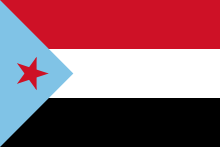Democratic Republic of Yemen
| Democratic Republic of Yemen | ||||||||||
| جمهورية اليمن الديمقراطية Jumhūrīyat al-Yaman ad-Dīmuqrāṭīyah | ||||||||||
| Unrecognized state | ||||||||||
| ||||||||||
|
| ||||||||||
| Capital | Aden | |||||||||
| Languages | Arabic | |||||||||
| Government | Unitary Marxist–Leninist[1] state | |||||||||
| President | ||||||||||
| • | 1994 | Ali Salim al-Beidh | ||||||||
| Prime Minister | ||||||||||
| • | 1994 | Haidar Abu Bakr al-Attas | ||||||||
| Historical era | Yemeni Civil War | |||||||||
| • | Established | 21 May 1994 | ||||||||
| • | Disestablished | 7 July 1994 | ||||||||
| Area | ||||||||||
| • | 1994 | 332,970 km² (128,560 sq mi) | ||||||||
| Currency | South Yemeni dinar | |||||||||
| ||||||||||
The Democratic Republic of Yemen (Arabic: جمهورية اليمن الديمقراطية Jumhūrīyat al-Yaman ad-Dīmuqrāṭīyah) was declared in May 1994. The DRY, with its capital in Aden, was led by President Ali Salim al-Beidh and Prime Minister Haidar Abu Bakr al-Attas and represented a response to the weakening position of the South in the Yemeni civil war of 1994. The new state failed to receive international recognition, despite the sympathy of Saudi Arabia for its position. Its leaders, in addition to Yemeni Socialist Party figures such as al-Beidh and Attas, included some prominent personalities from South Yemeni history such as Abdallah al-Asnaj who had been strenuously opposed to YSP one-party rule in the former People's Democratic Republic of Yemen.[2]
The secession followed several weeks of fighting that began on 27 April, and lasted from 21 May 1994 until 7 July 1994. The civil war ended after the DRY strongholds of Al Mukalla and Aden fell to government forces.
See also
References
- ↑ http://www.la-croix.com/Monde/Moyen-Orient/Au-Yemen-l-inderacinable-Ali-Abdallah-Saleh-2016-10-10-1200795219
- ↑ Paul Dresch, A History of Yemen, Cambridge: Cambridge University Press, 2000; p. 196
Coordinates: 12°48′00″N 45°01′59″E / 12.8000°N 45.0330°E
